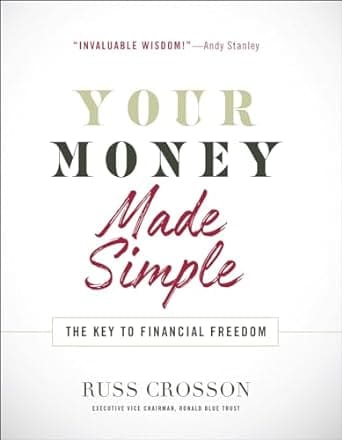
Your Money Made Simple: It Is Not Yours

Excerpt from Your Money Made Simple: The Key to Financial Freedom by Russ Crosson
Chapter 3
It Is Not Yours
As we begin our dive into the five uses of money and determine what number goes in each box, let’s look at a key difference in the boxes. Three of the categories are nondiscretionary, and two are discretionary. What do I mean by that? Boxes 1 (giving), 2 (taxes), and 3 (debt) are boxes that you are required to fund. They are not optional. You have to pay your taxes and debt payments. One could argue that you don’t have to give, but as we will see in this chapter, God’s Word is clear that as believers wanting to please Him, giving to His work and meeting the needs of others should not be an optional part of our spending plan just like paying taxes and debt.
Living expenses and savings are discretionary, which means you determine the amounts for these categories.
My Story
Shortly after Julie and I were married, we were working on our budget and determining what numbers would go into the five boxes. We figured out our living expense budget numbers, our taxes were set by the government, and by God’s grace, we had no debt, but it was the giving box that caused the most conflict and needed the most discussion.
Giving was not modeled for me growing up. My family attended church, but we were not consistent or generous in our giving. What I recall was a few dollars placed in the offering plate on a Sunday morning. Now I was married, and my bride was sending monthly checks to missionaries all around the world! Not only did I not agree with the amount she was sending but I had a hard time understanding why she was doing it. Plus, how were we going to provide and make ends meet if we gave away our money? It was an emotional issue for me, and I thought that surely God did not expect me to give and at the same time take care of my family. How was I going to get ahead?
In counseling people over the years, I have found we were not alone. Being aligned on whether you should give and what amount you should give can be a challenge. Different backgrounds, temperaments, and perspectives on money can all make this area of money management a difficult one to agree on.
Julie had grown up in a strong Christian family, and as a result, she already realized the importance of giving. She knew what the Bible had to say on this topic, and I had to catch up. As I grew in my understanding of God’s perspective on giving, I came to realize it was not only nondiscretionary, but to the contrary, there were a lot of powerful reasons to give. It also seemed that if I obeyed God in my giving, then the other boxes took care of themselves.
You may also think that giving is an optional or discretionary use of money. If money is left over after everything else is paid, then you might consider giving it away. Read on, and I will share with you what I learned; I hope you will see, just as I did, that giving is not optional, and it should be the first use of money, which is the reason it is box 1.
Wise Versus Foolish
To get to the heart of this issue, we can turn to Scripture. In 1 Timothy 6:17-19, we are instructed (many translations use the word “commanded”) to be generous and rich in good works: “Instruct those who are rich in this present world not to be conceited or to fix their hope on the uncertainty of riches, but on God, who richly supplies us with all things to enjoy. Instruct them to do good, to be rich in good works, to be generous and ready to share, storing up for themselves the treasure of a good foundation for the future, so that they may take hold of that which is life indeed.” The person who follows this command is considered wise. In contrast, in Luke 12, we read about the farmer who built bigger barns to store his earnings, was not generous, and as a result, was not rich toward God; he was called a fool.
You may be thinking, “Russ, that is easy for you to say, but the verse is written to those who are rich. I’m not rich.” I get it. Everyone thinks that they are not rich and that someone else has more—they are rich, and you are not. But let’s define rich. Rich is having more than you need. That definition fits most everyone reading this book. Of course, there may be exceptions, but in my experience, I have never counseled anyone who did not have enough to meet their needs. Maybe they did not have enough to meet their wants, but their needs were met. This should not be a surprise because God Himself says He will supply our needs in Philippians 4:19.
I like this modern-day paraphrase of the rich-fool passage in Luke 12:13-21:
Someone in the crowd said to Him, “Teacher, tell my boss to pay the full, year-end performance bonus he promised me.” But He said to him, “Man, who made me a judge or arbitrator over you?” And He said to them, “Take care, and be on your guard against all covetousness, for one’s life does not consist in the abundance of his possessions.” And He told them a parable, saying, “The stock options belonging to the manager vested after a major run-up in share price, and he thought to himself, ‘What shall I do, for I already have enough saved to send my kids to college, my house is paid off, and I already max out my 401(k) every year!’ And he said, ‘I will do this: I will open an investment account and create a passive income portfolio, and I’ll exercise my options and put the money there. And I will say to my soul, “Soul, you have a big enough portfolio to be financially independent; retire early; plan some vacations, play golf.”’ But God said to him, ‘Fool! This night your soul is required of you, and the portfolio you’ve built what use will it be then?’ So is the one who endlessly builds his net worth and is not rich toward God.”[1]
Why Give?
Before we determine the amount in this box, let’s look at six reasons why we give. The definition of why is the cause, reason, or purpose for something. Learning these reasons helped me get aligned with Julie and excited about giving.
Giving is a tangible way to acknowledge God’s ownership of all we have. First Corinthians 4:7 asks, “What do you have that you did not receive?” The cattle on a thousand hills are God’s, along with everything that moves in the field (Psalm 50:10-11). The earth and all it contains is His (Psalm 24:1). Deuteronomy 8:16-18 says that it is not the power and strength of our own hands that produce wealth, but rather, God has given us the ability to produce it. Giving acknowledges the ultimate ownership of our wealth and the provision of a sovereign God in our lives.
David understood this when he said, “Who am I and who are my people that we should be able to offer as generously as this? For all things come from You, and from Your hand we have given You” (1 Chronicles 29:14). Since God owns it, the right question is really not how much we should give but how much we should keep.
Giving is a tangible way to worship and show gratitude. God so loved the world that He gave His only begotten Son for us ( John 3:16). God modeled giving for us, and we are called to do the same. Giving allows us to show our gratitude and appreciation for all God has done for us and is a barometer of our hearts. Giving is one area of the Christian life that cannot be faked; a person’s checkbook or bank account shows what they value.
Giving is a way to show obedience to God’s command to give. This reason alone should show why giving is not a discretionary use of money and why we should treat it similar to debt and taxes. The command is clear in 1 Timothy 6:17-19 as well as Luke 6:38 and Proverbs 3:9-10. When Julie and I were first discussing giving, I had no idea this was something God commanded and that giving was an act of obedience toward Him. Because I desired to please God, giving became a required part of our financial plan.
Giving meets the needs of others. Wow! I could not believe that the reason I had what I had was to meet the needs of others. According to 2 Corinthians 9:12-14, if we are overflowing (or have more than we need), we should liberally meet the needs of the saints (others around us). But the Bible also talks about the reciprocal of that. If I had a need, someone else would have a surplus to meet my need: “At this present time your abundance being a supply for their need, so that their abundance also may become a supply for your need” (2 Corinthians 8:14).
Understanding this reason to give has resulted in a lot of joy for Julie and me. We keep cash on hand that is already accounted for in our giving amount and wait for God to show us a need. It may be the employee at the dry cleaners, the cashier at the grocery store, the service individual at the auto center, or the server at the restaurant. Let me encourage you to use some of your giving box to meet the needs of those around you. We do not get a tax deduction on the cash we give in this manner, but the joy we have received from this spontaneous giving is priceless.
Giving results in rewards in heaven. The Bible clearly states we will be rewarded for how we have used and invested our money (1 Corinthians 3:8-14; Philippians 4:17; Matthew 25:14-29). Second Corinthians 5:10 says, “For we must all appear before the judgment seat of Christ, so that each one may be recompensed for his deeds in the body, according to what he has done, whether good or bad.” Matthew 6:19-21 weighs in with, “Do not store up for yourselves treasures on earth, where moth and rust destroy, and where thieves break in and steal. But store up for yourselves treasures in heaven, where neither moth nor rust destroys, and where thieves do not break in and steal; for where your treasure is, there your heart will be also.” If we are wise, then we will send money ahead to heaven (a safe place) and receive rewards because it will not burn up if it is stored there. The farmer in Luke 12 missed this point. He only stored up his earnings for himself and was called a fool.
How do we invest in heaven? We invest in people and encourage them to believe in Jesus Christ and grow in their knowledge and obedience to the Word of God. People and the Word of God are the only two things that last forever. We can give to our local church or missionaries, send youth on summer mission trips, help build structures, provide food for the homeless, pay rent for a needy family, send workers to help those in difficult situations, or fund Bible translations. There are countless organizations and opportunities to give of your time and money. I encourage you to find one that is meaningful to you.
Giving breaks the power of money. Luke 16:13 says that we cannot serve two masters, for either we will hate one and love the other or we will be devoted to one and despise the other. We cannot serve God and wealth, and there is no freedom in trying to serve two masters. Giving allows us to hold our wealth with an open hand, puts God (instead of money) on the throne of our lives, and reminds us that we are simply stewards of all God has entrusted to us.
Jesus could have listed many subjects in contrast to serving God. He could have said God and power, God and prestige, or God and creation. But He didn’t. He said God and money. Why? Because money is the one thing in our lives that we feel can give us all the things we want (and that God wants to give us)—security, provision, power, contentment, self-worth, and identity. The word “cannot” in Luke 16:13 does not suggest that we might be able to serve God and wealth. It says we cannot. No wiggle room! It is impossible to serve both! So how do we make sure God is on the throne of our lives and not money? We give. A disciplined pattern of regular giving breaks the power of money because giving becomes a natural and vital part of our lives.
What Goes in the Box?
Now that you understand why it is important to give, how do you determine the amount that goes in box 1 (giving)? Let me give you three principles to assist you:
- You get to determine the amount. In the New Testament, there are no rules for how much to give. You are to give as the Lord has blessed you. Second Corinthians 9:6-7 says, “He who sows sparingly will also reap sparingly, and he who sows bountifully will also reap bountifully. Each one must do just as he has purposed in his heart, not grudgingly or under compulsion, for God loves a cheerful giver.”
It would be easier if the Bible gave us a defined percentage or amount to give, but it does not. You might be thinking, “But what about the tithe? Doesn’t the Bible tell us to tithe, or give 10 percent?” In the Old Testament, there was a tithe (10 percent) for the maintenance of the Levites (Leviticus 27:30 and Numbers 18:21); another 10 percent tithe for the Lord’s feast; and 10 percent every three years to provide for strangers, orphans, and widows (Deuteronomy 14:22). So 23 percent would be in compliance with the Old Testament, but we are no longer under that law; instead, we are under grace and the New Testament. So we get to decide how much to give. - The amount you give matters to God, and He is watching. Luke 21:1-4 illustrates the story of the widow’s mite. Jesus was watching and took note of the rich people putting in their gifts and the widow who put in two small copper coins, which was all she had. He commented that it was not the amount given but the amount compared to what the person had to give. The widow gave more because she gave all she had to live on, whereas the rich people gave from their surplus.
- You are to give according to your ability. Second Corinthians 8:3 says, “For I testify that according to their ability, and beyond their ability, they gave of their own accord.” Acts 11:29 tells us, “And in the proportion that any of the disciples had means, each of them determined to send a contribution for the relief of the brethren.” We can’t give what we don’t have, but we all have the ability to give something.
What About You?
What amount goes in your box 1 for giving? I suggest that you start with whatever percentage of your income you have already been giving. To determine this percentage, look at what you gave last year (to ministries or your church or to help a family member or meet a need) and divide it by the number in your income box. This calculation gives you a percentage that you are giving. Any money you gave counts in this calculation. It does not have to be tax deductible to a charitable entity. Approximately 20 percent of what Julie and I give is nondeductible, but it is still included in our giving box.
If you have not been giving, then I suggest you start with 10 percent, not because it is required, but because it is an easy number to multiply and will give you a starting point. As we continue through the book and see what you have in box 5 (savings), we can revisit this percentage to see if it could be larger or needs to be decreased for a season. As we already determined, giving is not discretionary for a believer. Now, take your current percentage (or 10 percent if you don’t have a percentage) and multiply it by your income number, and enter the resulting number in box 1 (giving) of the “My Plan” chart in the back of the book.
…
[1]. John Cortines and Gregory Baumer, God and Money (Carson, CA: Rose, 2016), 120-21.
Order your copy of Your Money Made Simple: The Key to Financial Freedom by Russ Crosson
YOUR MONEY MADE SIMPLE, Copyright © 2019 by Russell D. Crosson. Used by permission of Harvest House Publishers, Eugene, Oregon 97408. www.harvesthousepublishers.com
Trending Now
Sign up today for your Inspiration Today Daily Newsletter
Supercharge your faith and ignite your spirit. Find hope in God’s word. Receive your Inspiration Today newsletter now!
Russ Crosson
Russ Crosson is executive vice president and chief mission officer of Ronald Blue Trust and executive vice chairman of the board of directors for Thrivent Trust Company. Russ is the author of several books, including Your Life…Well Spent, The Truth About Money Lies, and What Makes a Leader Great. He has been a featured speaker at many venues, including Promise Keepers, Issachar Summit, and America’s Best Hope. He and his wife, Julie, are active in teaching and mentoring around the country on the subjects of money, marriage, and communication.
Related Articles
January 29, 2026
5 Traits of Good Leadership
The traits of good leadership aren’t just about results—they’re about relationships. Servant…
December 9, 2025
End-of-Year Giving Benefits: Tax Savings, Legacy Gifts & Stewardship
As the year draws to a close, many believers take time to reflect on God’s goodness, their personal…
November 29, 2025
What Does the Bible Say About Finances?
Learn what the Bible teaches about money, giving, and contentment. Explore 10 scriptural principles…
November 20, 2025
Can You Smile at Your Future?
When you make the Lord your dwelling place amid life’s storms, you can rest confidently in His…
Next Steps To Strengthen Your Walk
Inspiration Today Newsletter
Supercharge your faith and ignite your spirit. Find hope in God’s word. Receive your Inspiration Today newsletter now!
Christian Articles
Find articles to strengthen your walk and grow your faith. We have a wide range of topics and authors for you.
Submit A Prayer Request
We are here for you. Simply click on the button below to reach us by form, email or phone. Together we will lift our hearts and voices with you in prayer.





